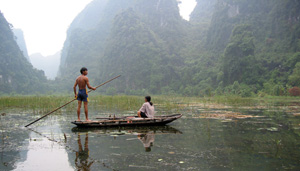Kien Giang province in the Mekong Delta is one of the most vulnerable provinces to climate change in Vietnam.
The province has over 200 km of coastline and 85 per cent of its land is less than one metre above sea level. Sea levels have already risen 20 cm in Vietnam, and are predicted to rise by one meter by the end of this century.
Up to 29 metres of Kien Giang's mangroves and coastline is lost each year to erosion, sea level rise and deforestation. Without mangroves and coastal forest as natural buffers, communities and their crops suffer from salt intrusion, storm surges and flooding.
Between 2008 and 2011, Australia partnered with Germany and the Government of Vietnam to help communities in Kien Giang to adapt to climate change and improve the management of coastal environments.
The Kien Giang Biosphere Reserve Project worked with the Kien Giang Provincial People's Committee and the Provincial Government to address climate change impacts through new technologies including building innovative fences to prevent erosion, rehabilitating coastal forests, promoting new mangrove planting techniques and improving dyke management.
Over the three years, the Project:
- installed more than 4.5 km of protective fences to improve the survival and growth rates of over 40 hectares of mangroves in Kien Giang's coastal areas
- introduced new sustainable livelihood activities for communities, such as growing salt tolerant crops, which increased household income by between 50 and 150 per cent for 98 households.
- increased community awareness of climate change impacts in the community–from just three per cent to 77 per cent after three years, and
- developed a teaching program and resources for primary schools on climate change, biodiversity and waste management which have now been incorporated into school curricula and are being used by 8000 teachers in over 280 schools across the province.
The result has been a reversal of erosion, a build-up of silt and increased growth and survival rates of mangroves. Communities are undertaking sustainable farming practices and moving to alternative livelihoods that adapt to the effects of climate change. Following these successes, the new coastal restoration techniques are now being up-scaled with funding from the Vietnamese Government.
The Project used a participatory approach and successfully brought together and provided capacity building to government, research institutes and community organisations such as the Youth and Women's Unions. The project management board included members from civil society, business, government and the community.
The Project also demonstrated effective donor coordination between Australia and Germany in line with the principles of the Paris Declaration on Aid Effectiveness. Australia has contributed $23 million for this work up to 2016.

